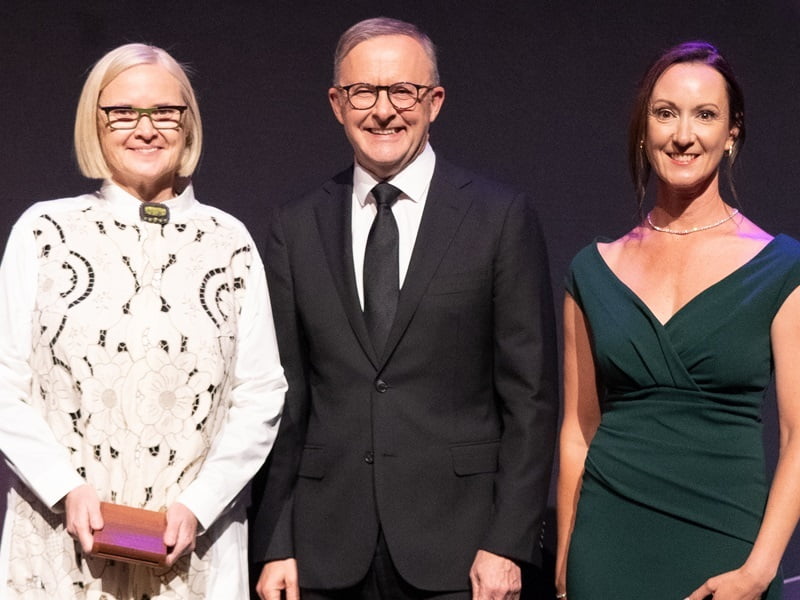The Prime Minister’s Prizes for Science were announced on Monday evening, with double the awards handed out for the Innovation and New Innovators prizes, respectively.
The winners of the Prime Minister’s Prize for Innovation were the founders of New South Wales-based molecular diagnostics solutions firm SpeeDx, Adjunct Professor Alison Todd and Dr Elisa Mokany, as well as the South Australia-based developers of mineral sample analysis technology PhotonAssay, Dr Nick Cutmore, Dr James Tickner and Mr Dirk Treasure.
The two winners of the Prize for New Innovators were University of Melbourne senior research fellow, data scientist, and founding member of Seer Medical Dr Pip Karoly, as well as University of New South Wales research director for Advanced Hydrogenation Associate Professor Brett Hallam.
Dr Cathy Foley, who selected the winners with the help of a committee, told InnovationAus.com that winners of the awards were so hard to distinguish, particularly given the diverse set of industries they represented, that they sought permission to award them all.

The winners of the Prime Minister’s Prize for Science and for Innovation received $250,000, while the other prize winners received $50,000.
SpeeDx was founded in 2009 to commercialise technology developed at Johnson and Johnson Research and now distributes over 45 different molecular diagnostic tests across 19 countries, including for SARS-CoV-2, cancers, and sexually transmitted infections. The firm’s molecular technology can also help identify drug-resistant infections, helping to fight antimicrobial resistance and avoiding the prescription of unnecessary or ineffective antibiotics.
Developed at CSIRO, the PhotonAssay technology was spun-out of CSIRO in 2016 through the founding of the Chrysos Corporation. The technology utilises high-energy X-rays to analyse gold and other valuable metal samples in mineral ore samples and has been fully automated using robotics and detectors.
Compared to the fire-assay process traditionally used by the mining sector, which would take at least a day to complete, the PhotonAssay process is complete within two minutes, produces half the carbon dioxide emissions, is chemical-free, and non-destructive.
Dr Karoly is being recognised for her work into epileptic seizure cycles which has been used by Seer to produce an app that forecasts epilepsy risk for those living with the disease. Associate Professor Hallam’s work in the field of hydrogen passivation in solar cells have been credited with improving the performance of solar cells by 10 per cent.
In addition to celebrating the prize winners ahead of the announcements, Prime Minister Albanese said the government would support research commercialisation and pure basic research.
“Australia is home to some of the world’s leading scientists. We make breakthroughs and discoveries that are the envy of the world. We need to do more though, to commercialise these victories for science,” the Prime Minister said.
“This government is committed to backing that commercialisation. At the same time, what should be emphasised is the need to back research without knowing what the commercial benefit might be.”
He added that the government would restore “scientific innovation and consultation as an indispensable pillar of our public policies” to support economic growth, promote better health outcomes, improve social inclusion and environmental sustainability.
In another passionate off-script display, Minister for Industry and Science Ed Husic continued to proclaim the importance of Australian science “to improve not only the well being of our nation, but to make a global impact to contribute at a global scale to improve the lives of the many, not the few”.
“We need to celebrate what you do, and importantly we need to back what you do. You have a government that is committed to involving more science, more of what you do, in the heart of policy and decision making, because we recognise fundamentally what drives you is to create that better future for all,” Mr Husic said.
The full list of winners on the night were:
- Prime Minister’s Prize for Science — University of New South Wales Professor Trevor McDougall: For his research on the fundamental physics of the ocean, which has transformed the field of ocean thermodynamics
- Prime Minister’s Prize for Innovation — SpeeDx Founders, Adjunct Professor Alison Todd and Dr Elisa Mokany
- Prime Minister’s Prize for Innovation – PhotonAssay Founders, Dr Nick Cutmore, Dr James Tickner and Dirk Treasure
- Frank Fenner Prize for Life Scientist of the Year: Australian National University Professor Si Ming Man: For his contribution in understanding the role of inflammation in health and diseases, and the microbes and molecules that inhibit or impact it
- Malcolm McIntosh Prize for Physical Scientist of the Year: Australian National University Dr Adele Morrison: For her work investigating the impact of changing ocean conditions on sea level rise and climate, particularly around the Antarctica
- Prime Minister’s Prize for New Innovators – Seer Medical founding member, Dr Pip Karol
- Prime Minister’s Prize for New Innovators – UNSW Sydney Research Director for Advanced Hydrogenation Associate Professor Brett Hallam
- Prime Minister’s Prize for Excellence in Science Teaching in Primary Schools – George Pantazis, Marble Bar Primary School, Western Australia: For leading an integrated STEM program combining western pedagogy with First Nations culture and knowledge
- Prime Minister’s Prize for Excellence in Science Teaching in Secondary Schools – Mrs Veena Nair: For developing curricular and extracurricular STEAM projects, including several new electives including 3D printing, emerging technologies, engineering and integrated art and technology projects like wearables
Do you know more? Contact James Riley via Email.

